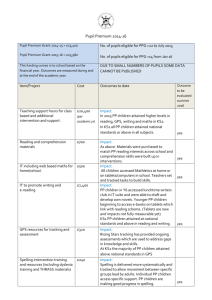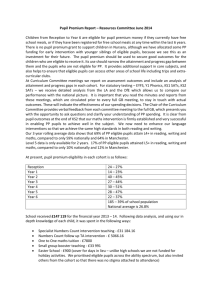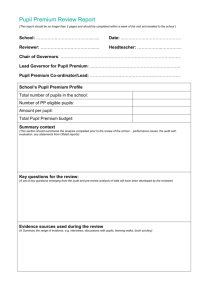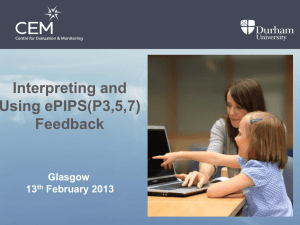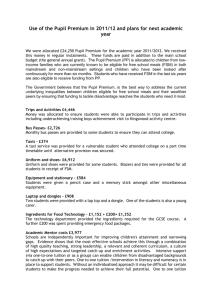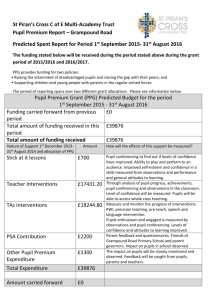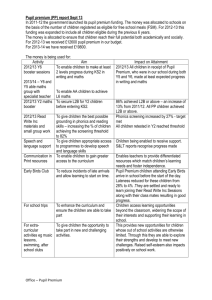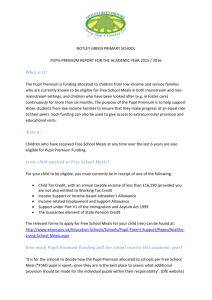Pupil Premium Grant Expenditure Report
advertisement
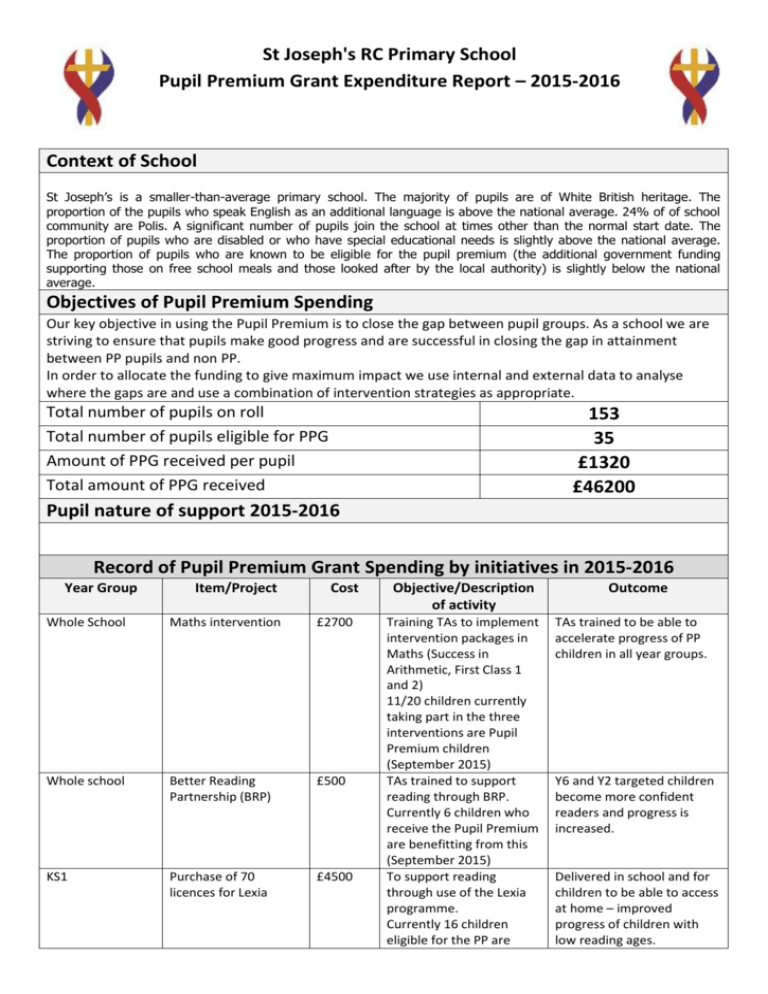
St Joseph's RC Primary School Pupil Premium Grant Expenditure Report – 2015-2016 Context of School St Joseph’s is a smaller-than-average primary school. The majority of pupils are of White British heritage. The proportion of the pupils who speak English as an additional language is above the national average. 24% of of school community are Polis. A significant number of pupils join the school at times other than the normal start date. The proportion of pupils who are disabled or who have special educational needs is slightly above the national average. The proportion of pupils who are known to be eligible for the pupil premium (the additional government funding supporting those on free school meals and those looked after by the local authority) is slightly below the national average. Objectives of Pupil Premium Spending Our key objective in using the Pupil Premium is to close the gap between pupil groups. As a school we are striving to ensure that pupils make good progress and are successful in closing the gap in attainment between PP pupils and non PP. In order to allocate the funding to give maximum impact we use internal and external data to analyse where the gaps are and use a combination of intervention strategies as appropriate. Total number of pupils on roll Total number of pupils eligible for PPG Amount of PPG received per pupil Total amount of PPG received 153 35 £1320 £46200 Pupil nature of support 2015-2016 Record of Pupil Premium Grant Spending by initiatives in 2015-2016 Year Group Item/Project Cost Whole School Maths intervention £2700 Whole school Better Reading Partnership (BRP) £500 KS1 Purchase of 70 licences for Lexia £4500 Objective/Description of activity Training TAs to implement intervention packages in Maths (Success in Arithmetic, First Class 1 and 2) 11/20 children currently taking part in the three interventions are Pupil Premium children (September 2015) TAs trained to support reading through BRP. Currently 6 children who receive the Pupil Premium are benefitting from this (September 2015) To support reading through use of the Lexia programme. Currently 16 children eligible for the PP are Outcome TAs trained to be able to accelerate progress of PP children in all year groups. Y6 and Y2 targeted children become more confident readers and progress is increased. Delivered in school and for children to be able to access at home – improved progress of children with low reading ages. KS2 Accelerated Reader £4000 KS2 Purchase of Bug Club £2000 Y1 and Y2 Breakfast Reading Club £1750 (2xTA for 8 hours a week) Rec and KS1 Purchase of Read, Write, Inc and relevant training. £10,000 Whole School Curriculum Enrichment £800 Whole School Outdoor Learning to inspire writing £1000 Y6 Maths intervention 0.5 Teacher Time £15000 Y6 Digismart English intervention –HT and TA time 1.5 hours a week £2000 Reception/Nursery Baseline assessment of £800 gross and fine motor using Lexia (September 2015). To support reading development through the use of a highly motivating programme. Currently 14 children eligible for the PP are using Accelerated Reader (September 2015). New resources to support reading development. This will allow 14 children eligible for the PP to have access to Bug Club. TAs encourage reading through daily 1:1 sessions during Breakfast Club. Children given a daily breakfast. 3 Children presently taking part are eligible for the PP (September 2015). Increased support to enable smaller teaching groups for Read, Write, Inc. 18 children eligible for the PP are using RWInc (September 2015) Adam Bushnell (author visit) worked with all children to inspire writing Children have a range of experiences outdoor which then feeds into their writing Teacher working with small group to consolidate skills/knowledge. 6 children eligible for PP are benefiting from this support (September 2015). LA Y6 children who are underachieving (including EAL) given specific support with language skills – written and spoken. Currently 4 children eligible for the PP are accessing Digi-Smart (September 2015). Identification of children/groups who need Children more motivated to read, confidence increased and progress accelerated. Greater % of PP @ Age related expectations (A.R.E.). Children enjoying reading more due to higher quality and engaging material. Greater % of PP @ A.R.E. Children benefiting from 1:1 reading sessions – improved attainment. Greater % of PP @ A.R.E. Children more settled to learn at the beginning of the school day. Improved attendance of PP children. PP children benefit from more intensive teaching sessions. Sustain good attainment in Phonics test. Impact evident in children’s writing. Evidence in books and greater % of PP @ A.R.E. Impact evident in children’s writing. Greater % of PP @ A.R.E. PP children – both HA and LA well supported to close the gap. Regular assessment indicating skills consolidated. LA PP children increase selfesteem and belief in their ability. Gross and fine motor skills developed to close the gap. skills Leadership Staff Tracking of PP children £1500 Whole Staff Purchase of Tracking System £4000 Big Maths Implementation of Big Maths £200 Y6 Enrichment Activity £1000 Y2 - Y5 Motor Skills Groups £2000 Whole School Mathletics £2500 End Year Total: £56,250 a programme of support and the implementation of this. 7 children identified for PP are benefiting from this support (September 2015). Leadership Staff released to track PP children and ensure intervention is having impact. Staff able to use data to focus on the target for all children make at least good progress. Implement Big Maths to aid arithmetic skills in line with the new curriculum Residential visit, including adventurous activities, subsidised to ensure it is inclusive. Specific targeted sessions to develop fine and gross motor skills including handwriting. Web based maths programme used to consolidate skills Higher % of children achieving GLD. Impact of intervention is evident for all groups. Leaders have good grasp of PP progress. PP children (along with other groups) are tracked carefully to ensure good progress. Improved % of children operating at A.R.E. in Mathematics. PP children able to participate in this activity and develop self-esteem, confidence in own abilities. Gap in writing narrowed against their cohort. Children have greater in pride in their work and a more motivated to write. PP become more confident in basic maths skills and higher % working at A.R.E.



